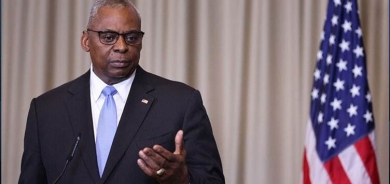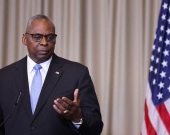Obama seeks to calm Netanyahu’s fears over nuclear Iran during Washington meeting

Netanyahu will meet with Obama at the White House later Monday, before addressing the American Israel Public Affairs Committee (AIPAC) later in the day, according to AFP.
Obama and Netanyahu are deeply at odds over how fast the clock is ticking toward possible military action against Iran’s nuclear program.
While Obama does not rule out the use of U.S. military force against the Islamic republic as a last resort, if diplomatic and economic pressure fails, Israel fears that time is running out before it is too late to take out its nuclear facilities.
Israeli officials reserve the right for their country to stage its own attack on Iran if they see no alternative, although Israeli analysts say a strong assurance of U.S. readiness to act would encourage restraint, at least in the short-term.
Even though Obama has offered assurances of stiffened U.S. resolve against Iran before the White House meeting, the two allies are still far apart on explicit nuclear “red lines” that Tehran must not be allowed to cross, and they have yet to agree on a time frame for when military action may be necessary.
Obama wants Israel to hold off on attacking Iran’s nuclear sites, insisting there is still time for sanctions and diplomacy to work. But he also vowed in a speech on Sunday to the largest U.S. pro-Israel lobby that he would be ready to act militarily -- with all “elements of American power” -- to prevent the Islamic republic from building an atomic bomb, according to Reuters.
Israeli leaders, who see Iran’s nuclear advances as a looming existential threat and reserve the right to act alone in self-defense, have made clear they are operating on a far shorter, more urgent timeline.
Their most immediate concern is that Iran be prevented from reaching nuclear weapons capability, not just from developing an actual device, and they worry that time is running out for an effective Israeli attack as Tehran buries its nuclear facilities deeper underground.
While Obama and Netanyahu -- who have had a strained relationship -- will share intelligence information on Monday, a source close to the administration said there was little reason to believe they would make significant progress toward bridging key differences on a common threshold for military action.
“They’ll be looking for mutual understandings and may find a few, but the biggest problem is they're working on different clocks," the source said.
While Obama in his address criticized “loose talk of war” he also gave a strong nod to Israel’s refusal to contemplate a nuclear-armed Iran.
“No Israeli government can tolerate a nuclear weapon in the hands of a regime that denies the Holocaust, threatens to wipe Israel off the map, and sponsors terrorist groups committed to Israel's destruction,” he said, to applause from members of the AIPAC.
Obama also acknowledged “Israel’s sovereign right to make its own decisions about what is required to meet its security needs,” drawing a swift vote of thanks from Netanyahu.
“I appreciated the fact that he said that Israel must be able to defend itself, by itself, against any threat,” he told reporters in Ottawa on Sunday, during a weekend stopover in Canada on his way to Washington.
“I very much appreciated the fact that President Obama reiterated his position that Iran must not be allowed to develop nuclear weapons and that all options are on the table,” Netanyahu added.
Analysts believe that Netanyahu will be seeking more precise guarantees in his private talks with Obama, while the president will want to retain room to maneuver.
“Obama doesn't want to wake up one morning and to hear that Israeli attack planes are hovering over Iran,” top-selling Israeli daily Yediot Aharonot wrote on Sunday.
“He... will explain that if the day arrives and there is no longer any choice, he will prefer to send the U.S. army to fight against Iran over the options of allowing the Iranians to have nuclear weapons.”
The issue has pushed the Israeli-Palestinian conflict far into the background, although U.S. efforts to revive stalled peace talks are sure to be discussed in the Oval Office.
In January, five rounds of “exploratory talks” between Israeli and Palestinian negotiators ended without a deal to continue discussions or return to direct negotiations.
Obama’s speech to AIPAC acknowledged the hurdles.
“Of course, peace is hard to achieve. There’s a reason why it’s remained elusive for six decades,” he said. “But as hard as it may be, we should not, and cannot, give in to cynicism or despair. The changes taking place in the region make peace more important, not less.”














